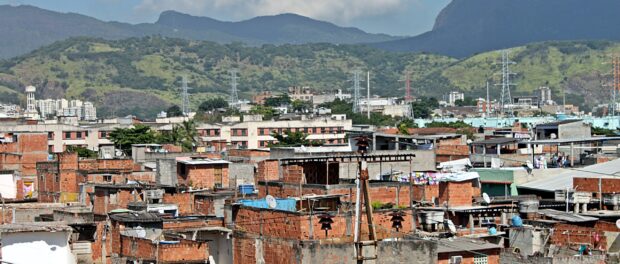
This is our latest article on the Covid-19 and its impact on the favelas and part of our series covering 2020’s Black July.
On July 28, as part of the 5th Annual Black July (Julho Negro) event series, residents of Manguinhos, a favela in Rio de Janeiro’s North Zone, and activists associated with their struggle for fair treatment participated in a discussion, broadcast live on YouTube, to present the state of their work and examine additional challenges brought on by the Covid-19 pandemic.
The discussion was moderated by Rachel Barros, an activist with the Manguinhos Social Forum, and Ana Paula Oliveira, cofounder of Mothers of Manguinhos. The speakers included Elizabeth Silva, an activist with Espaço Casa Viva and coordinator of the Social Enterprise Network for Socially Just, Democratic, Integrated, and Sustainable Development (RedeCCAP); geography teacher Gilson Alves; sociology teacher and healthcare worker Ludmila Oliveira; biologist and public servant Maria das Mercês Vasconcellos; and Ítalo Matheus da Silva, an activist with the Popular Youth Uprising of Manguinhos.
The speakers touched on topics including the coronavirus’ deadliness in favelas, youth empowerment, public education, and community mobilization. In highlighting the profound negative impact of the pandemic on favela residents in all areas of their fight, Elizabeth Silva said, “Beyond just revealing the inequality, the pandemic has deepened the abyss.”
The participants highlighted how, despite the severity of the pandemic, none of the dynamics that it brings out are new—evidenced by the fact that it has proved much deadlier in the favelas than in the formal city.
Elizabeth Silva said that Covid-19 is revealing that working class people like delivery workers and cleaners have had to continue commuting and working in spite of the virus’ rapid spread. Due to financial stress, many favela residents never had the opportunity to stay home and socially distance themselves.
“Vulnerable populations have never been allowed to protect themselves,” she argued. She labeled the contemporary situation a form of modern slavery, in which poor favela residents risk their lives to work at the service of rich Brazilians for poor remuneration. “Who are the rights for?” she asked.
Alves built on this idea, stating that the situation constitutes a genocide in that “there exists neither public policies nor interest” in protecting the favela residents.
Underreporting of cases, the speakers pointed out, is yet another indication of the government’s lack of interest in the well-being of favela residents. Ludmila Oliveira, who spent time working in a health clinic during the pandemic before coming down with the virus, highlighted the major discrepancy between official and actual statistics, noting that “what we observed in the clinic was completely different.” Furthermore, she pointed out that favela residents, using the public health system don’t have access to the same treatments as those under private care.
In order to establish a long-term remedy to this situation, the speakers praised community engagement as a fruitful path. Vasconcellos, a public employee who works within Manguinhos, stressed the importance of residents’ points of view and emphasized that she was taking part in the event “to listen more than to speak.”
“There needs to be a relationship bas ed on dialogue,” Elizabeth Silva added, stressing that “we are the ones taking care of ourselves.”
ed on dialogue,” Elizabeth Silva added, stressing that “we are the ones taking care of ourselves.”
“What is invisible for society is visible for those of us that live and work within the favela,” she said, highlighting the irreplaceable role of local knowledge in mobilizing and solving problems. She also praised the numerous community-based organizations already working within Manguinhos that give the favela the potential to move along a constructive path toward better lives for all.
Along these lines, Ítalo Matheus da Silva pointed out that groups like the Popular Youth Uprising, with which he is involved, “must do their part.” He said that Manguinhos’ great diversity, which the speakers characterized as containing “many Manguinhos within Manguinhos,” represented a great opportunity for positive involvement.
Another important potential axis of community improvement that is being hurt by the pandemic is education.
Access to technology has proved to be a major obstacle, as many families do not have sufficient access to smartphones or Wi-Fi. The speakers called for Internet access to be a right in today’s digital world. Beyond the fundamental technological challenges, Alves, who works in the public school system, pointed out that the new remote learning format has caused many students to lose interest in their studies.
Despite the challenges that Covid-19 has brought to Rio’s favelas, the speakers were able to see hope for a better future. All of them took note of the remarkable acts of solidarity among favela residents.
“With goodwill, we can move forward,” said Elizabeth Silva. “We are the protagonists of our own story.”

